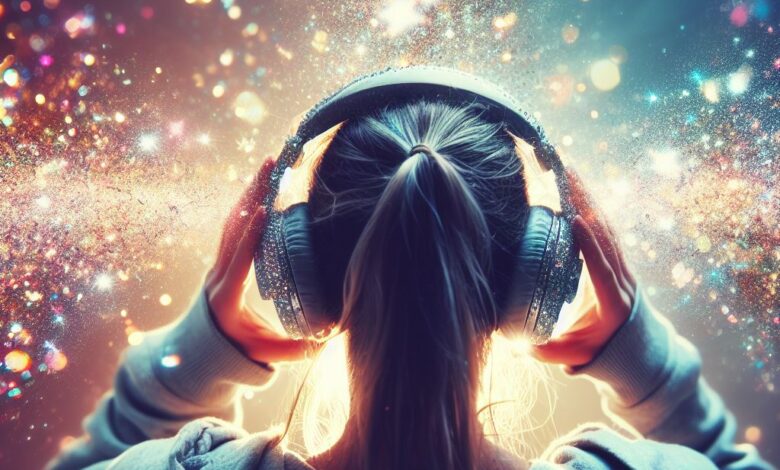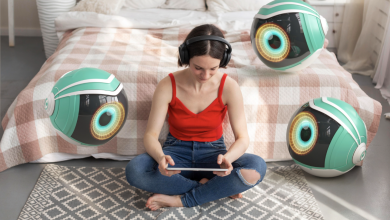
The music industry is seemingly experiencing an existential crisis with the arrival of genAI. Just take a look at the news stories asking whether AI can replace your favourite singer, or what the fate of musicians is, if AI can start making music.
Is there an inkling of truth to these headlines? Are we really heading towards a future where machines are going to replace our favorite artists?
It’s important to remain calm. Remember, other predictions from the past have been a little overzealous:
“Music streaming is going to kill radio”. The number of total radio listeners in Germany has remained stable for five years.
“Netflix is going to kill cinemas”. Barbenheimer grossed over $1bn in 2 weeks.
“genAI is going to kill human music”. Well…
When AI crept into what was always believed to be an inherently human capability – creativity – I was personally devastated. I could live with a computer calculating better than me, but seeing it write better text, draw better, and speak better than me, it was easy to lose all hope.
But after assessing the various factors around genAI, I believe there is hope that it will not result in the end of human creativity. The quality of genAI’s output is lagging behind human music creations but I’m certain it will catch up eventually. However, there are more factors that will mitigate the impact of genAI on the medium we love so much – music. Here are my seven reasons why genAI does not spell the end of creativity in music:
Authenticity
Everyone claiming that genAI is taking over the music industry is reducing music to its mere sound. To understand this, we must think about why humans invented music: to tell and memorise stories. The melodies were the medium for easier remembrance rather than the main purpose. AI cannot replace the human element of music creation.
Zeitgeist
The reason it is so hard to predict a hit single is that there is an endless number of parameters that result in a trending track. Sound is just one of them. Factors such as local emerging scenes and global events can all contribute to a track’s success.
For instance, Disco, HipHop, Trap, and Grunge emerged from the underground scene and eventually became mainstream successes. Their creators were rebelling against current trends and society and expressing their struggle.
Therefore, automating the process of human intuition and trial and error through AI won’t always work. GenAI can certainly perpetuate these trends but it’s unlikely to actually create these trends.
Recognisability
Unlike most creative products, music’s subjective utility and emotional equity grow if you consume it repeatedly. Every time we listen to a track, we build more individual connections to it. Advertising and film production studios leverage these qualities to evoke a strong emotional response from the audience.
In theory, this also applies to AI-generated music, but since the power of genAI lies in creating a continuous, individualised stream of music, it’s unlikely that we will re-listen to the same piece of music, in the same way, we do with human music.
Cost to generate
Paradoxically, human-created music is in principle cheaper than genAI. Every genAI startup needs a business model and needs to generate revenue in some form or another.
On the other hand, a young person in their bedroom doesn’t have the same commercial pressures. There are countless talented artists who are making music as a creative outlet rather than out of commercial interest. It is incredibly difficult for commercial businesses to compete with that level of passion. Cost to operate It is generally believed that genAI still has the better user experience as it generates a tailored track to a given search prompt.
However, modern recommendation algorithms that search suitable tracks from pre-existing catalogues are extremely sophisticated. Not only have these search algorithms caught up with genAI but have actually surpassed it in terms of accuracy and fit to the prompt. While generating a song is computationally heavy and thus expensive, searching a song out of a pre-existing catalogue is far cheaper and oftentimes faster. And it doesn’t matter if it searches AI-generated or human-created music.
Data
Music files are also several times bigger than images, making training AI much more expensive. The files and corresponding metadata are also more difficult – and potentially illegal – to obtain.
Bytedance and Google have been struggling with this exact problem as sampling with MusicLM requires processing through language models one by one to obtain fine-grained acoustic tokens.
Funding
If you were to compare how many images you come across in a day in contrast to the number of songs you listen to, it is clear that genAI has a significantly smaller problem to solve in music compared to other creative industries. Therefore, investing billions of dollars in funding doesn’t make economic sense. For example, Open.ai alone has raised almost five times the total value of the entire music genAI market.
Curation is the way to go
For the seven reasons I’ve outlined, I don’t see genAI’s impact on music as drastic as some of the more pessimistic voices in the foreseeable future. Instead, I view it as an opportunity to widen the range of tools that artists have to play with. Companies like Boomy or Loudly show how genAI can improve the creative process in different parts of the music industry.
However, genAI is producing a significant paradigm shift in how we interact with search engines. The simplicity of the user experience to type in exactly what you need in your own words and not having to rely on cryptic musical keywords is nothing short of a revolution. The music industry can learn a lot from adopting this UX to level the playing field between the advantages of AI-generated music versus human-created music.
Interestingly, even for genAI companies, it’s cheaper and easier to surface an existing track than to generate a new one from scratch.
This is precisely why in a future of exponentially growing music content, what the industry truly needs is to focus on the power of curation and searchability. AI can deliver that, by surfacing the perfect track for any occasion in real-time. AI can play a hugely pivotal role as it can categorise music libraries and provide recommendations for the perfect track from a huge collection of music in a matter of seconds.
It’s a future that Daniel Ek, Spotify Co-founder and CEO is looking forward to. Ek recently pointed to the opportunities for AI for music discovery: “We still think there [are] enormous benefits [from] core machine-learning, or AI, improvements in discovery. That’s going to be massive, and you can see some of those improvements already paying off very nicely [with] higher engagement and higher retention, which then lowers churn.”
The future of AI in the music industry
The industry needs to consider how valuable AI will be as a new avenue for creating music. Or whether AI provides greater opportunities to develop further revenue streams by finding more value in what we already have – a hugely valuable resource of existing music which is still not being utilised or monetised successfully.




